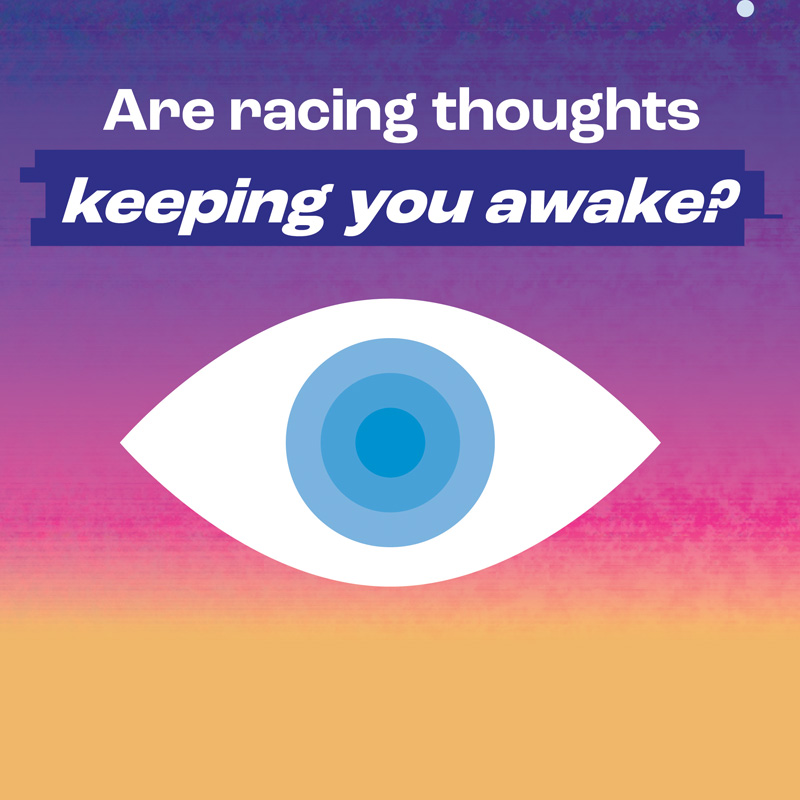- Sleep is a natural part of our internal biological rhythm. We need to sleep to help process memories or information, and also to rest and repair parts of our body that need it.
- Most people need around 8 hours of sleep a day, but this also depends on how old you are. If you’re older or younger, you may need more or less. Some people naturally need more sleep, and some less.
- If we don’t get a good night’s sleep, we don’t necessarily need to catch up the next night by sleeping for longer – it’s important instead to just be able to get to sleep.
- If we don’t sleep properly for several nights, or for a long period of time, our thinking skills, mood and behaviour can change.
- If someone doesn’t sleep at all for a day or two, they may start to feel very strange, and may even see or hear things that other people can’t, and feel paranoid – like someone is watching them or coming to get them.
Sleep difficulties and LGBTQ+ people
- For Lesbian, Gay, Bisexual, Transgender, Queer/Questioning (LGBTQ+) people, sleep difficulties are not uncommon.
- This can be for a variety of reasons, including the bedroom not feeling safe, worrying more than usual and playing lots of video games.
- We also know that eating and drinking habits can affect sleep, such as drinking coca-cola or coffee in the evening, or snacking late at night.
- Sometimes LGBTQ+ people may have experienced stressful or traumatic things, such as being assaulted, and may have nightmares as a result.
Tips to manage sleep difficulties
Catch it
Change it
Check it
Contextualise it
Catching sleeping patterns
In order to understand how sleep difficulties can impact us, it is helpful to keep a record. Think of it like a sleep diary. This helps us to “catch” sleeping patterns and anything connected to them, to help us understand what may be going on. It can be helpful to repeat this every day for a week or two.
- What was I doing in the hours before bed? (Include smoking, eating, drinking, video games, phone etc)
- Did I do anything in bed other than sleep or sexual activity?
- What time did I go to bed, and what time did I actually fall asleep?
- Did I wake up at all during the night? If so, for how long?
- What time did I wake up the next morning?
- When I woke up, how rested did I feel out of 10? (1 = exhausted, 10 = super rested)
Checking out sleeping patterns
Once we have begun to catch any sleep patterns, we need to try check out if there’s anything else going on we need to be aware of. This is because we know that things such as our physical health, or worry thoughts in our head, can affect our sleeping patterns
Am I feeling OK physically? If I feel tired all the time it might be worth discussing with my doctor as I may need some supplements to help me.
Have I noticed that I am using my bed for lots of other things, such as revision, playing games or watching TV? Maybe I have started to associate my bed with things that are not supposed to happen in bed!
Have I noticed on my sleep diary that when I don’t feel rested, I always seem to be doing something before bed? If so, try and stop or reduce this, and see if that makes a difference.
Have I noticed that I am lying in bed lots waiting to fall asleep, but that it never seems to happen?
Changing sleeping patterns
OK, we have caught some of our sleeping patterns, and checked out some of the things that could be affecting this from our sleep diary. The next thing to do is try to change what we are doing.
Start to build a ‘sleep-bed’ association by not watching TV, eating, revising or playing games in bed.
Get into a routine – do something each night that relaxes you before bed.
If the bedroom doesn’t feel safe, is it possible to sleep in another room for now?
If you are worrying a lot before bed, ask yourself: ‘can I solve this now?’ If yes, solve it. If no, tell yourself you’ll deal with it tomorrow.
If you get into bed and don’t fall asleep, get up and do something else.Come back to bed when sleepy.
Contextualise sleeping patterns
One important thing to consider with sleeping difficulties and patterns is context – what is going on? Importantly, is it within my control, and is it affecting my safety? As LGBTQ+ people, we sometimes can’t change big things like laws and policies very easily, though we can consider how we interact with our context, and protect our own bubbles.
I can ask myself: are there things affecting my sleep that areoutside of my control? What does feel within my control?
I can ask myself: am I noticing that I’m more anxious than usual, and this is affecting my sleep? If so, what can I do to feel a little less anxious?
I can ask myself: if something is worrying me and keeping me up at night, who can I talk to that could support me with this?
I can ask myself: are there people who I feel comfortable and safe with, that I can call upon for support when I am struggling with sleep?
